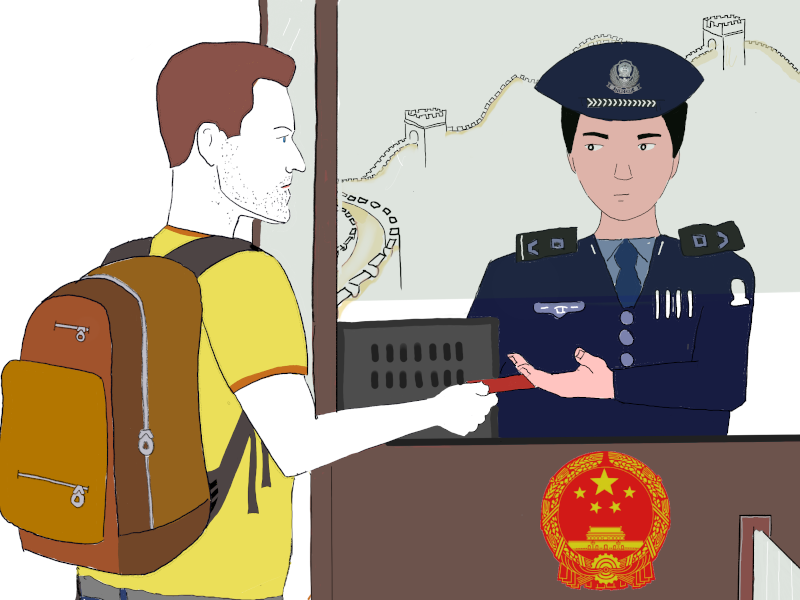Research Projects
The reconfiguration of whiteness in China: Privileges, precariousness, and racialized performances
With the rise of China’s economy, more and more westerners are moving to China for business and job opportunities. One consequence of this reverse migration is the transformation of whiteness from a majority identity in western countries to a minority identity in China. What are the advantages and disadvantages of being white in China’s thriving market economy and consumer culture? How is whiteness racialized in relation to blackness and other immigrant identities in various social domains and in different regions in China? How are multiple versions of whiteness negotiated and performed through daily life interactions between white migrants and Chinese in various social and personal settings?
ChinaWhite, with its full project title “The reconfiguration of whiteness in China: Privileges, precariousness, and racialized performances,” is a five-year research project (2019-2024) funded by a European Research Council (ERC) Consolidator Grant. The project is hosted by the Amsterdam Institute for Social Science Research (AISSR) at the University of Amsterdam, the Netherlands. Multi-sited and multi-scalar ethnographic research will be conducted on daily life encounters between various groups of white migrants and Chinese in five domains: (1) state policy regarding international migrants in China; (2) the ESL industry (teaching English as a second language); (3) the media, fashion, and entertainment industries; (4) transnational business and entrepreneurship; and (5) interracial romance. This project contributes to a new line of research on white racial formation in East Asia by creatively integrating theories in whiteness studies and migration studies. It also expands the geographical scope of research on white expatriates from global cities in coastal areas to second-tier cities in inland China.

White Monkey or White Privilege? An Ethnographic Study of Capitalising and Representing Whiteness in China
By postdoctoral researcher Aldina Camenisch
My postdoctoral research investigates the often blurred boundaries between ‘proper’ and ‘white privilege’-related employment opportunities for foreigners in China with a focus on ‘foreign face’ or ‘white monkey’ jobs. I define this phenomenon as jobs for which having a white face is the major or even only requirement and the representation of this white face the most important task. In ethnographic fieldwork combining participant observation and narrative interviews, I aim to address questions about the occurrence of the ‘white monkey’ phenomenon, the role of white capital and the interplay of positionalities, and the performance of whiteness, occidental westernness and Chineseness. This project is theoretically informed by Critical Whiteness Studies, Performance Studies and debates on Occidentalism and positioned at the intersection between two research domains of the ChinaWhite project, (3) the media, fashion, and entertainment industries, and (4) transnational business and entrepreneurship.

Breaking All Molds: Transnational Romance Between White Women and Chinese Men
By postdoctoral researcher Willy Sier
Willy Sier researches the reconfiguration of whiteness in the Chinese context through the lens of romantic relationships. She is particularly interested in relationships between White women and Chinese men for their defiance of the dominant patterns in the world of transnational romance. Through analysing media reporting and blogs published in the online WWAM-community - an acronym for Western Woman Asian Man - she examines the logics that underpin the belief in the exceptional status of these relationships. Currently, Willy is also researching how Chinese-White couples got stuck in conflicting mobility regimes related to their mixed citizenship status in the wake of the Covid-19 outbreak in Wuhan.

The Price is White? Foreign Teachers in China’s Private ESL Industry
By PhD researcher Raviv Litman
How does whiteness function as a type of capital for multiple stakeholders in China’s private ESL sector? How do recent changes, in particular the expansion of online education due to the corona pandemic, destabilize the field of ESL and the value of whiteness within it?
I research the function of white capital among multiple stakeholders in the ESL sector including foreign teachers, ESL companies, and students. I use qualitative ethnographic methods to study for-profit ESL programs in China and the racialized labor of foreign teachers on the digital apps and physical classrooms of Chinese ESL companies.

Who is White? Racialized performances in China's media, fashion, and entertainment industries
By PhD researcher Ke Ma
This project employs ethnography and media analysis methods to examine the multiple versions of whiteness enacted through westerners' activities in China's media, fashion, and entertainment industries. Specifically, this project will look into westerners' performances, experiences, and positionalities in Chinese cinema, the modeling industry, and the vlogging scene. Four research questions frame this project. First, what kinds of racialized aesthetic and affective labor are performed by western actors, models, and vloggers under the Chinese gazes? What is the role of gender in shaping these performances? Second, how does Chinese nationalism manifest in the racialization of western actors, models, and vloggers? Third, how do gender and class contribute to the tension between privileges and precariousness in western migrants' experiences in China? Fourth, how does the global outbreak of COVID-19 impact vloggers and models living and working conditions in China? How does it impact Chinese perceptions of whiteness?

The racialization of whiteness in intercultural business relations: Western migrant entrepreneurs in Shanghai
By PhD researcher Christina Kefala
This project regards Shanghai as a contact zone between as western migrant entrepreneurs and Chinese individuals in business settings. It focuses on three groups of western entrepreneurs: long-term migrant entrepreneur residents, recent newcomers and student- turned entrepreneurs. I have three research questions. 1) What are the motivations of different types of westerners in migrating to China? How does China’s socio-political context influence their aspirations to become entrepreneurs? 2) How do processes of racialization – that relate to Chinese state policy, local authorities (regulations, bureaucracy), and daily interactions with Chinese citizens in the business sector -shape and determine both opportunities and constrains for western entrepreneurs? 3)To what extent does the spread of the covid-19 pandemic affect the construction of whiteness in China, as evidenced in daily interactions with western entrepreneurship as well as in popular Chinese perceptions of whiteness?

White Monkey or White Privilege? An Ethnographic Study of Capitalising and Representing Whiteness in China
By postdoctoral researcher Aldina Camenisch
My postdoctoral research investigates the often blurred boundaries between ‘proper’ and ‘white privilege’-related employment opportunities for foreigners in China with a focus on ‘foreign face’ or ‘white monkey’ jobs. I define this phenomenon as jobs for which having a white face is the major or even only requirement and the representation of this white face the most important task. In ethnographic fieldwork combining participant observation and narrative interviews, I aim to address questions about the occurrence of the ‘white monkey’ phenomenon, the role of white capital and the interplay of positionalities, and the performance of whiteness, occidental westernness and Chineseness. This project is theoretically informed by Critical Whiteness Studies, Performance Studies and debates on Occidentalism and positioned at the intersection between two research domains of the ChinaWhite project, (3) the media, fashion, and entertainment industries, and (4) transnational business and entrepreneurship.

Breaking All Molds: Transnational Romance Between White Women and Chinese Men
By postdoctoral researcher Willy Sier
Willy Sier researches the reconfiguration of whiteness in the Chinese context through the lens of romantic relationships. She is particularly interested in relationships between White women and Chinese men for their defiance of the dominant patterns in the world of transnational romance. Through analysing media reporting and blogs published in the online WWAM-community - an acronym for Western Woman Asian Man - she examines the logics that underpin the belief in the exceptional status of these relationships. Currently, Willy is also researching how Chinese-White couples got stuck in conflicting mobility regimes related to their mixed citizenship status in the wake of the Covid-19 outbreak in Wuhan.

The Price is White? Foreign Teachers in China’s Private ESL Industry
By PhD researcher Raviv Litman
How does whiteness function as a type of capital for multiple stakeholders in China’s private ESL sector? How do recent changes, in particular the expansion of online education due to the corona pandemic, destabilize the field of ESL and the value of whiteness within it?
I research the function of white capital among multiple stakeholders in the ESL sector including foreign teachers, ESL companies, and students. I use qualitative ethnographic methods to study for-profit ESL programs in China and the racialized labor of foreign teachers on the digital apps and physical classrooms of Chinese ESL companies.

Who is White? Racialized performances in China's media, fashion, and entertainment industries
By PhD researcher Ke Ma
This project employs ethnography and media analysis methods to examine the multiple versions of whiteness enacted through westerners' activities in China's media, fashion, and entertainment industries. Specifically, this project will look into westerners' performances, experiences, and positionalities in Chinese cinema, the modeling industry, and the vlogging scene. Four research questions frame this project. First, what kinds of racialized aesthetic and affective labor are performed by western actors, models, and vloggers under the Chinese gazes? What is the role of gender in shaping these performances? Second, how does Chinese nationalism manifest in the racialization of western actors, models, and vloggers? Third, how do gender and class contribute to the tension between privileges and precariousness in western migrants' experiences in China? Fourth, how does the global outbreak of COVID-19 impact vloggers and models living and working conditions in China? How does it impact Chinese perceptions of whiteness?

The racialization of whiteness in intercultural business relations: Western migrant entrepreneurs in Shanghai
By PhD researcher Christina Kefala
This project regards Shanghai as a contact zone between as western migrant entrepreneurs and Chinese individuals in business settings. It focuses on three groups of western entrepreneurs: long-term migrant entrepreneur residents, recent newcomers and student- turned entrepreneurs. I have three research questions. 1) What are the motivations of different types of westerners in migrating to China? How does China’s socio-political context influence their aspirations to become entrepreneurs? 2) How do processes of racialization – that relate to Chinese state policy, local authorities (regulations, bureaucracy), and daily interactions with Chinese citizens in the business sector -shape and determine both opportunities and constrains for western entrepreneurs? 3)To what extent does the spread of the covid-19 pandemic affect the construction of whiteness in China, as evidenced in daily interactions with western entrepreneurship as well as in popular Chinese perceptions of whiteness?
